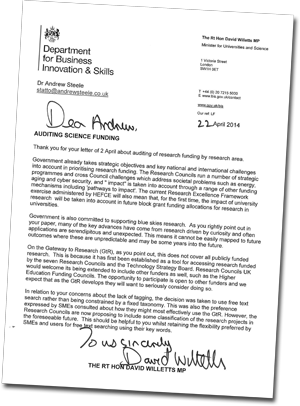Letter from David Willetts: Auditing science spending

We at Scienceogram believe that making sense of government spending, on science and otherwise, is best done by comparing the amounts that we spend on science to the size of the problems that science is trying to solve.
This isn’t at present possible within government: there is no auditing of research spend by objective, meaning that no-one in government knows for sure how much is spent on research into, for example, a particular disease like stroke, or energy technology. The figures Scienceogram uses come from a variety of different sources, some governmental, some academic, but we think it would be very valuable to have a centralised, official repository of these numbers. After all, how can you make policy when you don’t know what you’re spending?
Andrew recently posed this question to David Willetts, Minister for Universities and Science, and followed their conversation up with a letter. The letter, and the Minister’s response, are copied below.
We’d like to thank Mr Willetts for his response. It’s particularly heartening that the Gateway To Research tool is being expanded to make it more useful, as this has the potential to be a powerful resource for auditing some parts of of government-funded research. However, we think that there is still work to be done here: it is important that the government starts collating these figures across all departments, using them to make sense of how much we spend on science.
Auditing science funding and the Scienceogram
Dear Mr Willetts,
Thank you for your time yesterday at the British Library. I am e-mailing to follow up on my question about auditing of research funding by research area.
As I mentioned yesterday, I have been working on a project called Scienceogram (see scienceogram.org) which attempts to compare investment in science with the economic and wider costs associated with the problems that science is trying to solve. This seems to me to be broadly the correct methodology for allocating research funding but, in the absence of official statistics, making these comparisons is difficult and time-consuming.
I also share your passion for open data, and believe that making such figures available would be an important step towards more transparent government, allowing scrutiny by both the general public and scientists.
The Gateway to Research programme you mentioned is certainly a step in the right direction, but it has two major shortcomings. Firstly, the data are incomplete; my preliminary analysis shows that grants listed in the system only account for around 75% of the science budget in the period 2010-13, with even larger fractions missing at other times. Secondly, the data are not tagged or otherwise categorised, making building a taxonomy of research very difficult.
If you would like further information, Scienceogram made a submission on this subject to the House of Commons Science and Technology Committee during their call for evidence on science funding (available on the inquiry website, or as a printable PDF). The summary outlines our position well:
- We recommend that assessments of R&D funding should take place within the context of the social and economic problems that science is trying to solve.
- The government therefore needs to collect improved data on R&D funding broken down by socioeconomic objective.
- These should be collated alongside corresponding, commensurate data on the scale of the economic and social challenges, as well as projections of the costs of achieving socioeconomic and scientific goals through R&D.
- The government should make these data publicly available, and integrate them into R&D funding targets.
I would be very keen to discuss this further. Please let me know if this would be possible, and perhaps we can arrange a convenient time.
Many thanks,
Andrew
The response from Mr Willetts is copied below. You can also download the original PDF.
Dear Andrew,
AUDITING SCIENCE FUNDING
Thank you for your letter of 2 April about auditing of research funding by research area.
Government already takes strategic objectives and key national and international challenges into account in prioritising research funding. The Research Councils run a number of strategic programmes and cross Council challenges which address societal problems such as energy, aging and cyber security, and ‘impact’ is taken into account through a range of other funding mechanisms including ‘pathways to impact’. The current Research Excellence Framework exercise administered by HEFCE will also mean that, for the first time, the impact of university research will be taken into account in future block grant funding allocations for research in universities.
Government is also committed to supporting blue skies research. As you rightly point out in your paper, many of the key advances have come from research driven by curiosity and often applications are serendipitous and unexpected. This means it cannot be easily mapped to future outcomes where these are unpredictable and may be some years into the future.
On the Gateway to Research (GtR), as you point out, this does not cover all publicly funded research. This is because it has been established as a tool for accessing research funded by the seven Research Councils and the Technology Strategy Board. Research Councils UK would welcome its being extended to include other funders as well, such as the Higher Education Funding Councils. The opportunity to participate is open to other funders and we expect that as the GtR develops they will want to seriously consider doing so.
In relation to your concerns about the lack of tagging, the decision was taken to use free text search rather than being constrained by a fixed taxonomy. This was also the preference expressed by SMEs consulted about how they might most effectively use the GtR. However, the Research Councils are now proposing to include some classification of the research projects in the foreseeable future. This should be helpful to you whilst retaining the flexibility preferred by SMEs and users for free text searching using their key words.
Yours sincerely,
David Willetts